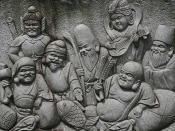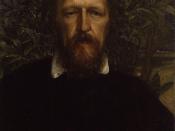"To save our souls and heal the State", the words of George Gordon portrays how the English Literature is in danger. John Stuart Mill's critical essay "What is Poetry?" as well as "The Study of Poetry" by Matthew Arnold both depict in defense of poetry. Robert Browning's "Caliban upon Setebos" and Lord Alfred Tennyson's "In Memoriam A.H.H.", both face religious crises and "heal". All four of these authors clearly depict in their work and support Gordon's statement.
John Stuart Mill states in his critical essay "What is Poetry", that poetry is not form and is interested in emotions, while "the one does in work by convincing or persuading; the other, by moving. The one acts by presenting a proposition to the understanding; the other, by offering interesting objects of contemplation to the sensibilities" (1140). He also states, "the distinction between poetry and what is not poetry, whether explained or not, is felt to be fundamental: and, where everyone feels a difference, a difference there must be" (1139).
He depicts the difference of poetry from fiction, paintings and music. Although they all convey emotions, they have "no natural connection" (1140). The main difference between poetry and fiction is truth. "The truth of poetry is to paint the human soul truly: the truth of fiction is to give a true picture of life" (1141). To understand poetry and prose, it requires one to possess particular amounts of knowledge.
On the contrary, in Matthew Arnold's "The Study of Poetry", he depicts the difference between science and poetry. He states that science will be incomplete without poetry. He believes that science consists of human experiences and truth while poetry has to do with morals or religion. He states:
"Our religion has materialized itself in the fact, in the...


